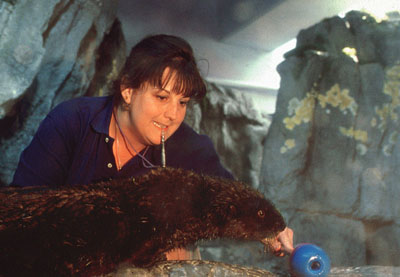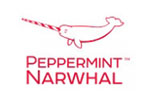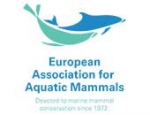
Home / Careers /
How To Become A Trainer: Careers With Marine Mammals
The International Marine Animal Trainers Association, IMATA, is a professional group composed of persons active in the marine animal field and other individuals who are interested in marine mammals. IMATA is dedicated to the advancement of its profession through improved training and husbandry techniques, increased communications among various zoo and aquarium professionals, and the promotion of public awareness through education.
Choosing a career path and acquiring a position requires a certain amount of thought, research and preparation no matter what your field of interest happens to be. IMATA has prepared this information to assist you in making some decisions about this line of work.
 What positions are available to me?
What positions are available to me?
Within marine science related courses lie many exciting and challenging jobs ranging from a marine animal trainer to a zoo keeper or from an oceanographer to an environmental scientist. In order to develop a better understanding of the different career opportunities available to you, we have listed and briefly describe a number of positions in the marine sciences.
MARINE BIOLOGY
A marine biologist is engaged in all studies of marine organisms from whales to algae. They often study nearshore and inshore communities as well as the open oceans.
OCEANOGRAPHY
Oceanography applies to many different areas which study the oceans and the processes taking place within them. It is a complex field that has many divisions. A chemical oceanographer researches the chemical changes at work in the sea, tracing pollution and dealing with its removal and prevention. A geological oceanographer studies shorelines, ocean floors, sediment layers and mineral content. Physical oceanographers study the physical properties of the oceans, currents, tides, and waves and how they are affected by atmospheric events. A biological oceanographer studies animal communities in the open ocean.
ZOOLOGY
Zoology is the study of all animals, their evolution and their scientific classifications. Zoologists often specialize in the study of one particular species.
ECOLOGY
Ecology is the study of relationships between organisms, their environment and how their communities are affected by human activities such as pollution and development.
ANIMAL BEHAVIOR
Animal behavior involves the study of an animal's natural behavior and evolution. This type of research can be important in the management of animals and their habitat.
VETERINARY MEDICINE
Veterinary medicine involves rehabilitating or caring for, stranded or orphaned animals. Veterinarians diagnose medical conditions, perform surgery, and prescribe and administer medication.
ZOOKEEPING
Zookeeping involves the basic care required to maintain the health of a collection of animals. A zookeeper may work with a variety of different animals including mammals, birds, reptiles, and fish. Zookeepers are responsible for cleaning animals enclosures, feeding the animals, and monitoring animal behavior.
REGULATORY CAREERS
Environmental issues have become a major focus of interest to the public, government and industry in recent years. Within the marine sciences, there are many careers that deal with the regulatory aspects of the field. The agencies may study animal populations, protection of animal environments and populations, or permit regulation. This aspect of animal preservation is an essential part of ensuring species survival.
MARINE MAMMAL TRAINING
Marine mammal training is a conditioning process through which animals receive mental stimulation, physical exercise and husbandry care. Animal trainers are responsible for the total mental and physical health of the animals in their care. This includes the hands on work with the animals as well as pool maintenance, water quality, and diet preparation. Marine mammal trainers often participate in the production of educational programs for visitors and guests. Ultimately, it is education that allows the public to develop an understanding and respect for marine life which will help to ensure its survival.
 Do I have to have a college degree?
Do I have to have a college degree?
Simply put, the answer is no; you don't HAVE to have a college degree. Will a degree be advantageous? Definitely! A degree will enhance your knowledge and understanding of your career. There are numerous facilities that are unwilling to hire without a degree or a degree in progress. Usually, the only away around this requirement is to have a substantial amount of applicable experience. Realistically, a college degree is very important.
How do I prepare for my career?
There are many ways to prepare yourself for the challenges and opportunities that lie ahead of you! The marine mammal field is constantly growing and changing. It is important to do as much research as you can. Take classes that will advance your public speaking skills and knowledge of the animals and environment in which you will be working. If you are going to be working with animals, the abilities to think clearly, quickly and with common sense are unspeakably important. Physical fitness is also a definite prerequisite. You will probably spend a great deal of time in or near an aquatic environment making strong swimming skills essential. In addition, if you are not already certified, you should probably take SCUBA lessons. Most facilities require that you pass a swim test and be SCUBA certified before they will hire you.
How do I become involved?
Fortunately, there are a number of ways to become involved in the marine animal community. It is important to visit facilities and learn their operations, resources and procedures. This may give you a better idea of the organizations you would like to work with. On a more national level, you should consider joining at least one of several professional organizations. The best way to learn about job opportunities is to become a member of an established reliable professional organization. For instance, IMATA, like other professional organizations, publishes a quarterly magazine, Soundings, which includes not only current information but job availabilities as well.
Should I volunteer or intern?
It is relatively easy to gain practical experience and knowledge before you professionally enter the field of your choice. Volunteering and interning provide you with experience in a hands on setting before you make your final decision on which career to pursue. It is important to prepare yourself for a paid or unpaid position, it's a foot in the door and a step in the right direction!
BEST OF LUCK!!
















